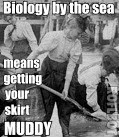...bad charter schools are bad."
Arne Duncan, who might be my Secret Zen Master if it weren't for Eugenie Scott (Darwin's Golden Retriever), is about to address the National Alliance for Public Charter Schools today about the need to curtail the existence of bad charter schools. We can't use public money to fund institutions that aren't going to be good for students to attend.
I've been leery of charter schools, holding them at arm's length till I can make up my mind about them. But I've been thinking about them a lot more since I was given a very unofficial invite to come teach in one in Chicago. And I think the important thing to know about them is that good charter schools are good -- they provide a sheltered eddy of high academic expectations and real educational resources to students who would otherwise get swept away in the undertow*.
But bad ones are bad -- they create an enclave of provincialism when they've been chartered to prevent students from having to learn about "controversial" things like evolution, or they create an even thicker glass ceiling for the underprivileged when they've been chartered for the purpose of funneling students into low-paid, low-status jobs.
Kozol**, for example, writes about such charter schools; one in cosmetology, which shunt students away from college prep; other examples are "health care" schools that train students to be vet techs and nursing techs, or at the worst, a "textile sciences and engineering" school in CA that basically trains Latino students to work in a local textile mill. Bad charter schools prey on the underprivileged that they claim to serve.
Charter schools are not entirely unregulated, but they are free from a lot of the bureaucratic control of the city, county, or state school system. They can actually create *real* options and choices for parents in a way that the ridiculous voucher system doesn't. They are run partly or mostly on public money, and tuition is free. In that sense, there is a free-market sort of thing happening with them. Good ones are good, and bad ones are bad. Given enough real information about them, parents (sometimes with the help of teachers) can make true choices about their child's education, and (ideally) the bad ones would lose students until they fixed themselves or perished.
But it isn't a real solution, because there just aren't enough slots in the "good" charter schools to serve all of our children. As great as a charter school might be -- and they *can* be great -- they can't be more than a distraction in the grand scheme of things. A useful distraction, maybe: charter schools like KIPP can be educational test-beds, where different pedagogical strategies are tried out. But still a distraction from the bottom line.
Which is that education is a public good, and it requires money to do well. It requires money because it requires great teachers, smaller class sizes, and good resources and equipment. No amount of exciting, inspiring tales of 50 students who have been saved by a really good charter school can change the fact that currently, it is crystal clear to most students that they are not a priority to this country. No student, no matter how young, can walk into one of the rotten buildings we call schools in rural districts or inner-city neighborhoods and think that their education is important to anyone.
So I guess the upshot is, if you're a parent, I do encourage you to take a look at the charter school options available to your children. If you can get your child into one of the good charter schools that are good, then do it. And if the mainstream public schools in your area are good, then good -- enjoy the peace of mind you attain by knowing that your child is safe, and will be well educated. But do not forget the hundreds of other kids left behind, and don't think that because your kid got into a safe school, that everything is copacetic. Realize how important it is for every child to get the chance your kid got.
And as for me, I'm gonna go look at this school in Chicago, and if it is a good charter school that is good, I'll see about doing my student teaching there, because I think it would be good for me to have a good experience for my first time out. But I'm not going to forget that where I am needed is in the schools that are falling down, where students are yelled at for being stupid, and where nobody thinks that college is something they can do. And that's where I'm going to go.
* Sorry. I'm gonna work on that metaphor.
** Wait actually I think he's my Secret Zen Master.
